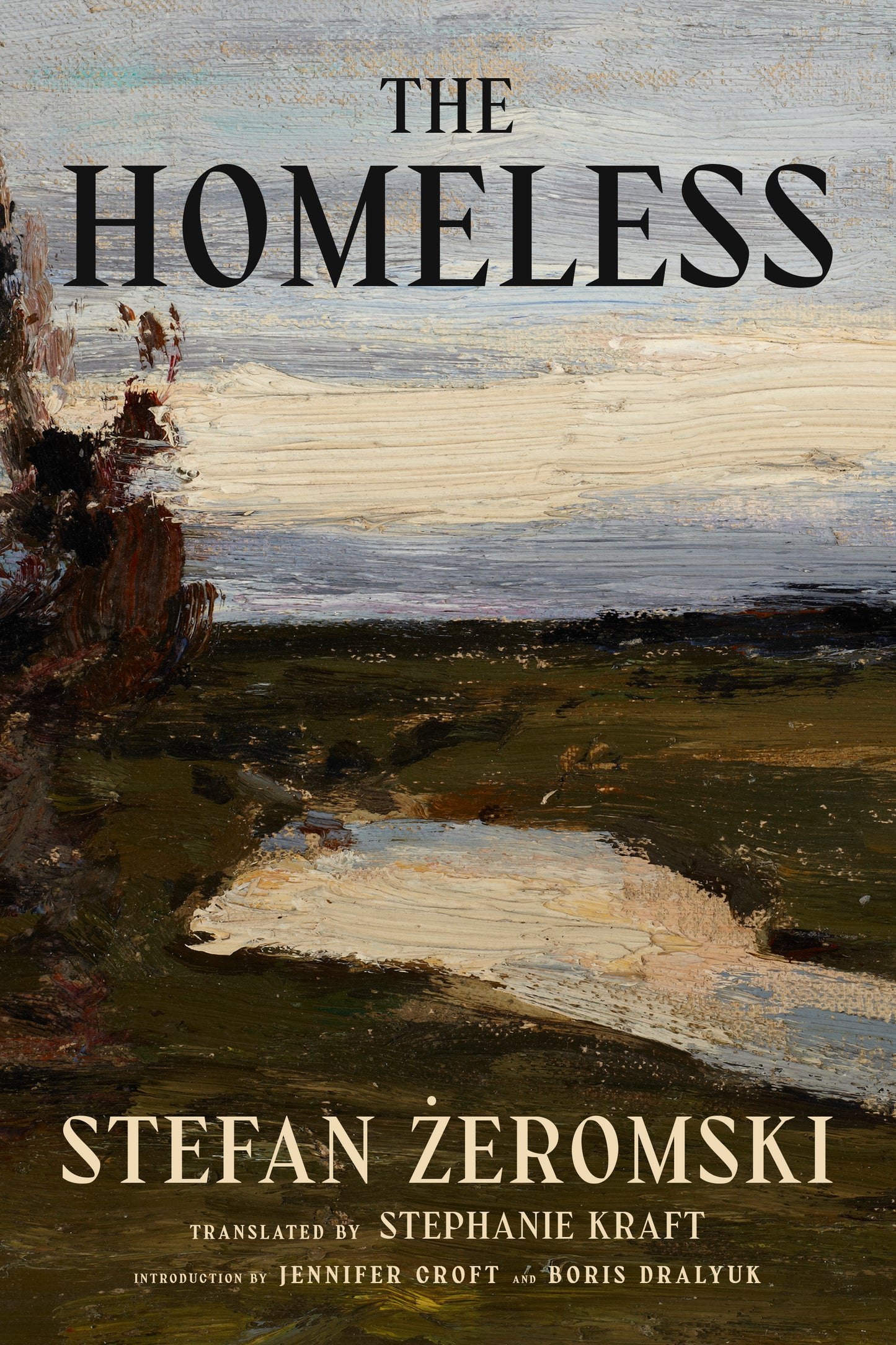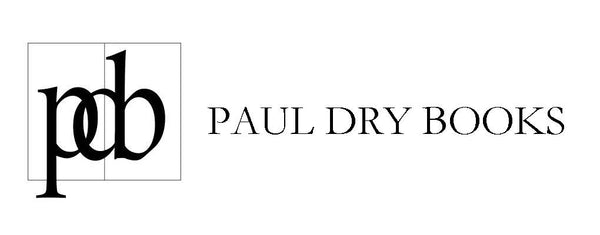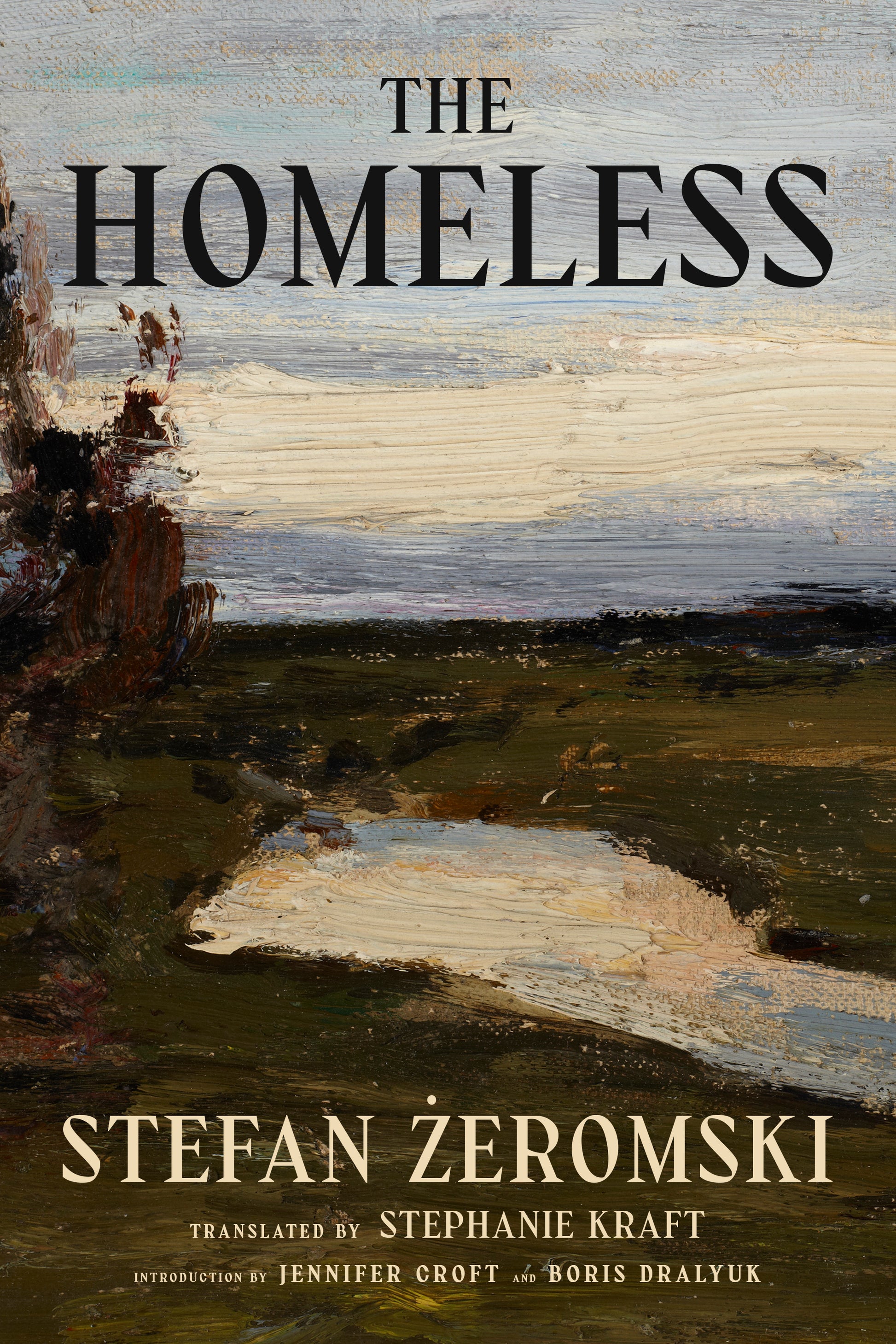The Homeless
The Homeless
Stefan Żeromski
Couldn't load pickup availability
Translated from the Polish by Stephanie Kraft
315-page paperback / 6" x 9" / ISBN 9781589881846
Publication Date: 3/26/2024
“Although he was nominated for the Nobel Prize in literature four times, Stefan Żeromski’s work is not as widely known outside Poland as it should be. Thus this elegant translation is most welcome . . . A beautiful, prescient story.”—Celia Jeffries, author of Blue Desert
"This novel was written more than 100 years ago, but its focus on economic inequality makes it abundantly relevant to today’s world . . . Powerful, moving, kaleidoscopic."—Times Literary Supplement
Beautifully translated by Stephanie Kraft, this new edition includes an Introduction by Jennifer Croft and Boris Dralyuk.
Tomasz Judym was born in a slum in Warsaw. Against all odds, he has become a doctor, and he finds that his driving motivation to treat disadvantaged people like those he grew up with is at odds with the expectations of his peers. He sees the unhealthy working and living conditions of the working class in twentieth-century Poland wearing on those around him, even as he strives to help them. As he battles alone to do the kind of work that boards of health and other agencies do today, Dr. Judym wrestles inwardly with feelings of inferiority and revulsion caused by his difficult childhood. His mission takes him out of the city and into the countryside, bringing him into conflict with his other desires, and the love that he feels for a sympathetic woman whose background differs fundamentally from his own.
The Homeless combines concrete detail about social issues—the urgent need for public hygiene and access to medical treatment, the effects of industrialization on health and the landscape, and the disinterest that people in power have in the disadvantaged—with beautiful, artistic passages of prose that sensitively probe the characters’ inner lives. The title comes not from the obvious reference to the impoverished people Dr. Judym concerns himself with, but from the unmoored status of the protagonist, the woman he loves, a mysterious engineer friend of his, his brother, and many others who find themselves rootless—emotionally and physically alienated by class divides and the social upheaval of industrialization. The Homeless is a portrait of the time and place it was written—Poland on the precipice of the twentieth century—that speaks to our current time and place.
“Żeromski’s descriptions are lyrical and his characters face moral challenges . . . Any reader who can take the time to appreciate beautiful writing and strong, good characters will enjoy the journey.”
—Booklist
"Żeromski’s novel and Kraft’s translation are richly descriptive . . . Żeromski writes with a style that conveys sweeping universalism while plucking vivid details."
—Broad Street Review
“Although he was nominated for the Nobel Prize in literature four times, Stefan Żeromski’s work is not as widely known outside Poland as it should be. Thus this elegant translation is most welcome. Set in Paris, Warsaw, and the spa town of Cisy, the novel is surprisingly modern. At its heart is the story of Tomasz Judym, a young doctor torn between his dedication to bettering the situation of those in the poverty he had escaped and the seduction of working for those who live comfortable, seemingly sophisticated lives. When he meets a young woman who shares his views, he must make a decision about his future. Throughout the novel, descriptions of nature echo the struggle of life at the turn of the century as Judym recognizes that what is sickening his patients is sickening the earth as well. A beautiful, prescient story.”
—Celia Jeffries, author of Blue Desert
“A much welcome—indeed, superb—translation of a Polish classic, The Homeless follows a young idealistic doctor making his way in a world in need of change. Moved by the plight of both the lower classes and the natural environment, he confronts the overweening materialism of the age of industrialization. The concerns raised by the great Polish novelist Stefan Żeromski over a century ago still resonate today.”
—Patrice M. Dabrowski, author of Poland: The First Thousand Years, editor, H-Poland
“Translated in all its lyricism and reverence for the natural world, The Homeless is formally Victorian in style, but timeless in sensibility. Żeromski was celebrated for his critique of environmental destruction and the woeful state of public health in Poland at the end of the nineteenth century, but a surprising bonus here is his proto-feminist empathy with both educated women forced by social convention into marriage or frivolous pursuits and poor women whose lives are limited to child-bearing, hunger, ignorance, and the potential heartbreak of emigration.”
—Karen Manners Smith, Emerita Professor of Women’s History, Emporia State University
“For all the seeming outwardness of his mission to create hygienic living conditions for the poor, Tomasz Judym, the impassioned doctor at the center of The Homeless, is equally in thrall to his own porous, lush, and turbulent interiority. In a different author’s hands, this high-minded romantic hero, subject to such flights and falls of emotion and sensation, could prove exhausting. Yet Judym never fails to fascinate, largely because of the marvelous poetic prose of Stefan Żeromski—so granular are his descriptions and evocations, so dense with ingenious metaphors, arresting visual imagery, and music.”
—Deborah Gorlin, author of Open Fire and Life of the Garment
"Hailed in turn as his nation's conscience and the spiritual beacon of his generation, Stefan Żeromski weaved, with The Homeless, a poignant story of a young doctor torn between ambition, vocation, and love—one that remains as sadly compelling and compassionate today as it was over a century ago."
—Jeremi Szaniawski, Amesbury Professor of Polish Language and Culture, UMass Amherst
“Dr. Judym, who comes from a poor Jewish family, is a highly dedicated doctor without a home of his own, a ‘doctor without borders’ who unapologetically advocates for and delivers expert medical care and humanitarian aid to those in greatest need while making the ultimate sacrifice of his own personal happiness. The detailed descriptions of nature and of the coal mine create a sense of awe but also show how nature can be raw and unforgiving.”
—Mark Poznansky, MD, PhD, Director, Vaccine and Immunotherapy Center, Massachusetts General Hospital; Professor of Medicine, Harvard Medical School
“Żeromski describes the bleak and powerless lives of industrial workers with a pathos that elicited a wide contemporary response to the novelist’s call for social reform. As the protagonist, Dr. Tomasz Judym, forces upon himself a choice about which class he will serve, Żeromski illuminates the socioeconomic matrix that precipitated many of the great conflicts and sweeping political changes of the 20th century. The novel is not an easy read, but it is worth the reader’s patience.”
—Frederick Smith, MD, physician and bioethicist specializing in the care of indigent patients
"The Homeless addresses the persistent challenges of infectious disease outbreaks and dangerous workplace exposures. A poignant story of the struggle of one individual to promote public health that resonates to this day."
—Lisa Chasan-Taber, Professor and Chair, Department of Biostatistics & Epidemiology, School of Public Health and Health Sciences, University of Massachusetts
Read Stephanie Kraft's Translator's Note about the process of translating The Homeless.
Also available as an e-book:
Amazon
Apple iTunes Bookstore
Barnes & Noble
Google Play
Kobo (See IndieBound's list of independent booksellers selling e-books.)
Stefan Żeromski (1864-1925) was born near Kielce, Poland into a family that was aristocratic but not wealthy. He was a great lover of landscape; imagery from his home region, which included the Holy Cross Mountains, is prominent in his work. He was employed briefly in a famous spa town that was the model for the spa in The Homeless before he became a librarian. He led many social and educational movements that pushed back against restrictions imposed by the powers that occupied Poland before World War I. At one time he and his wife hosted an orphanage and an underground Polish school in their home. In the 1920s Żeromski was a leading contender for the Nobel Prize for Literature. Distinguished in his own time and known as “the conscience of Polish literature,” he was deeply mourned on his death in 1925.
Stephanie Kraft is the author of No Castles on Main Street and the translator of two Polish novels, Stone Tablets by Wojciech Żukrowski (Paul Dry Books, 2016) and Marta by Eliza Orzeszkowa (with co-translator Anna Gąsienica-Byrcyn). She was a newspaper reporter and freelance writer for forty years and travelled annually to Poland for more than thirty years.
Jennifer Croft is an author, critic, and translator. She won the Man Booker International Prize for her translation from Polish of Nobel laureate Olga Tokarczuk’s Flights and a Guggenheim Fellowship for her novel The Extinction of Irena Rey.
Boris Dralyuk is a poet, translator, and critic. He is the author of My Hollywood and Other Poems (Paul Dry Books, 2022) and won a National Book Critics Circle award for his translation of Andrey Kurkov’s Grey Bees.


